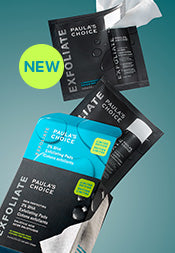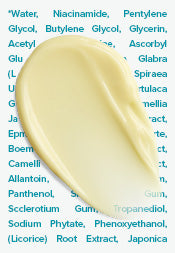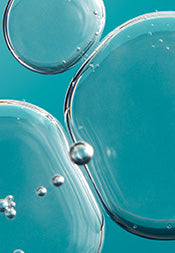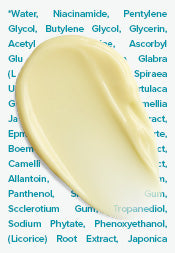Anti-Ageing Ingredients Your Skin Needs Now

At Paula’s Choice Skincare, we know that giving your skin the right anti-ageing ingredients it needs is important. Doing so means your skin can be radiant, as well as look younger and smoother. Moreover, by finding skincare products with these essential ingredients, you’ll see fewer signs of ageing, such as fine lines, wrinkles and deep lines.
To help you, we summarised some of the key things to look for when shopping for anti-ageing skincare products. It can be confusing, but after reading this, you’ll have a much clearer understanding of what ageing skin really needs—all supported by published, scientific research, not meaningless hype!
The Best Skincare Is Like A Healthy Diet
The topic of diet in connection to the skin is about comparing the complex needs of your body with the complex needs of your skin.
It’s a fact that our bodies need an array of nutritional foods to keep us healthy, and so does our skin. Eating only one food is never beneficial for your body, and using one great skincare ingredient (or one product, however great it may be) will never serve the complicated needs of your skin, especially as time marches on!
The fact is your ageing skin needs a balanced, elaborate mixture of powerful ingredients from the right skincare products to promote smoother skin, revive radiance, even out skin tone, and visibly minimise other signs of ageing, such as wrinkles.
Skin isn’t just surface: It’s your body's largest organ and it requires a complex range of ingredients to look beautiful and younger.
Anti-Ageing Products Come in All Forms
For anti-ageing products to provide visible benefits, they need to contain specific types of ingredients which we explain below. A surprising fact: The texture of anti-ageing products doesn’t need to be heavy or creamy; lighter textures can be just as “anti-ageing”!
As long as the product contains the best anti-ageing ingredients, the texture can be a cream, lotion, serum, gel, or even a liquid formula. When any of these varying skincare product textures are filled with proven anti-ageing ingredients, they will work wonders to improve the appearance of your ageing skin.
Your skincare products should have ingredients that support and maintain the skin’s resiliency, counter signs of environmental damage, and promote younger-looking skin. Let’s go over the five types of ingredients we consider must-haves for ageing skin!
The 5 Things Your Skin Simply Can't Go Without
1. Antioxidants
Without question, topically applied antioxidants are essential for ageing skin, and many brilliant ones show up in anti-ageing skincare products. Antioxidant skincare products include different forms of vitamins C, A and E for your skin, superoxide dismutase, beta-carotene, glutathione, selenium, green tea and derivatives, soy extract, grape extract, pomegranate extract, and dozens of others. The more of these that are included in your skincare products, the better!
Antioxidants can:
- Help thwart the visible effects of daily environmental assault
- Help increase the look and feel of skin’s firmness
However they can also become unstable when packaged in a jar because once opened, jars allow air in and air causes antioxidants to deteriorate. Skincare products containing antioxidants should be stored in
2. Skin-Replenishing Ingredients
Healthy, young skin’s surface naturally contains substances that keep it smooth. Doing so helps the skin retain an ideal balance of water to preserve its moisture balance. Products with skin-replenishing ingredients include ceramides, omega fatty acids, hyaluronic acid and peptide, and many more.
Skin-replenishing ingredients work to:
- Protect the skin’s surface against moisture loss
- Complement vital substances found in skin to help it look smoother and feel supple
- Help skin remain soft and hydrated
- Improve skin's texture
3. Skin-Restoring Ingredients
As a result of environmental exposure (including sun damage from not using a broad spectrum sunscreen daily), age, and midlife changes, skin can lose its ability to restore its youthful look the way it did when we were younger.
One way you can help turn this around is to apply anti-ageing products rich with restorative ingredients such as retinol for skin, peptides, lecithin, and products with adenosine. All of these help to revitalise and energise the skin’s surface so it reflects a younger-looking, visibly firmer appearance with fewer wrinkles and even skin tone.
Skin-restoring ingredients can:
- Revitalise the skin’s surface to restore a more youthful look
- Help counter the visible toll environmental exposure takes on skin
- Plump skin’s surface to reduce the appearance of fine lines and wrinkles
4. Sunscreen
About 75% of what we think of as signs of ageing are caused by unprotected sun exposure. That's why applying a broad spectrum sunscreen rated SPF 30 or higher every single day is the most important part of your skincare routine to decrease the risk of skin cancer and stop early signs of ageing.
Ready for a shocking fact? Sun damage begins within the first minute your skin is exposed to daylight, even if it’s cloudy. To ensure you're getting sufficient broad-spectrum protection, your sunscreen must state that it has “broad spectrum protection”, be rated SPF 30 or greater, and, for even more benefits, contain a mix of antioxidants.
It’s perfectly OK to layer makeup (like foundation) with sunscreen over your facial moisturizer with SPF.
Daily use of a well-formulated sunscreen will help:
- Diminish the look of wrinkles, redness, uneven skin tone, and loss of firmness
- Shield against both UVA (ageing rays) and UVB (burning rays)—that’s what we mean by “broad spectrum protection”
- Help preserve youthful substances on the skin’s surface that unprotected sun exposure routinely depletes
Note: The only significant difference between a daytime moisturizer (day cream) and a nighttime moisturizer (night cream) is that your daytime moisturizer should contain sunscreen. There aren’t special ingredients skin only needs at night and somehow cannot benefit from during daylight hours—that’s a beauty myth!
5. An Anti-Ageing Formula That Suits Your Skin Type
Now that you know the types of ingredients that should be in any leave-on anti-ageing product you use, the question is: What type of product should you buy? Should you shop for a lotion, gel, serum, cream, liquid, or balm?
Here's how to choose the right anti-ageing product:
Thicker creams, balms, and ointments contain oils and emollients that are best for dry to very dry skin. There are hundreds of emollients, but some widely-used examples include all non-fragrant plant oils, shea butter, cocoa butter, and fatty acids like lecithin, stearates, and triglycerides.
Lotions and serums are ideal for normal to combination skin because of their lightweight, often silky textures and near-weightless feel on the skin. These textures are also great for layering if you have slightly dry to dry skin, plus clogged pores or bumps.
Gels, liquids, or non-aqueous serums are extremely unlikely to clog pores and are best for oily or congested skin.
Combination skin can benefit from using multiple products: i.e., a gel in oily areas (usually the centre of the face) and a creamier texture on any dry spots, including around the eyes.
No matter the anti-ageing product’s texture, every skin type needs the same types of skincare ingredients to look younger and healthier, as well as protect the skin against environmental damage that results in premature ageing.
Sunscreens, antioxidants, skin-replenishing ingredients, and skin-restoring ingredients are the best anti-ageing products. That way, you can have smoother and younger-looking skin starting now!
While you’re at it, check out Paula’s Choice Singapore website and browse an exclusive range of skincare products that can help slow down the signs of ageing.












